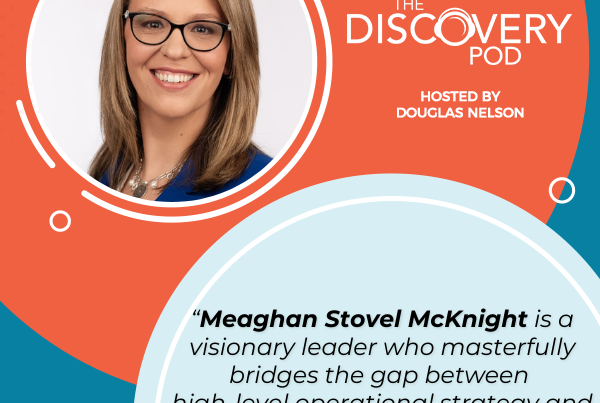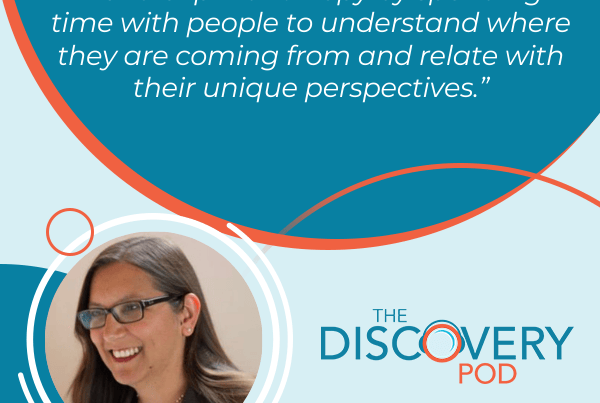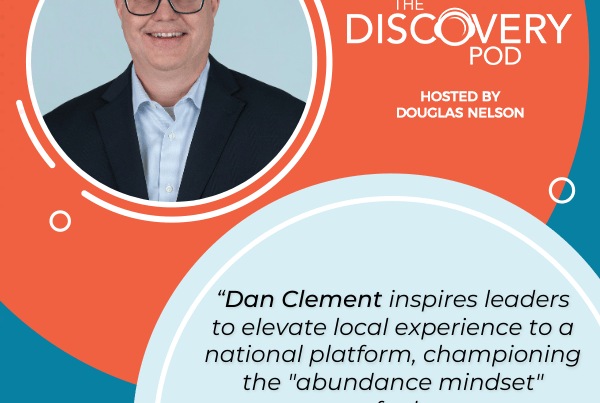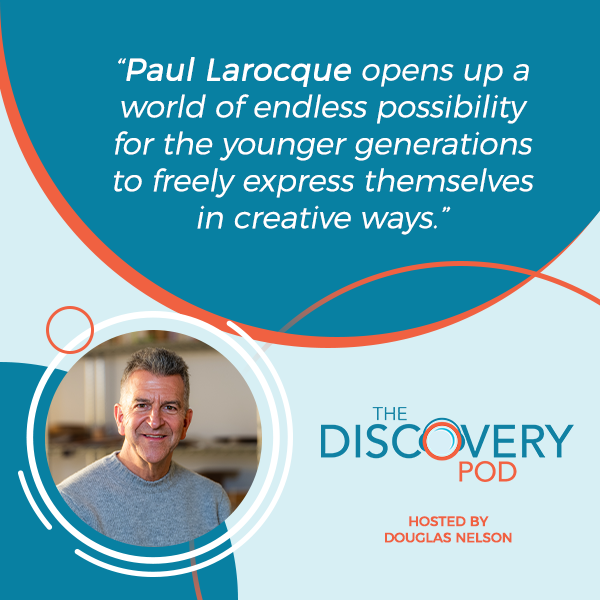
The arts opens pathways for young people to develop enriching lives. In this episode, Paul Larocque, the CEO and President of Arts Umbrella, takes us into the growth of Arts Umbrella and how it has stayed true to its purpose in engaging youth in arts education. He also reveals the importance of having extraordinary leadership in fulfilling the mission of inspiring children and impact in has had in the community. Holding onto the organization’s purpose leads to the growth and success of the organization. This is an episode you don’t want to miss. Join Paul Larocque and Douglas Nelson, host, in this insightful episode on the significance of youth creativity, exploration, and expression.
—
Listen to the podcast here
Arts Umbrella With Paul Larocque, CEO & President
Our guest on this episode is Paul Larocque, CEO of Arts Umbrella. Those of you who know Arts Umbrella know the iconic role it plays on Vancouver’s Grandville Island and its important impact on youth and arts education across the province and beyond. For those of you who don’t know the organization, sit down and get comfortable. You’re about to have a lesson in purpose-based leadership.
In our conversation, Paul talks about how the organization has grown from 45 students to more than 20,000 and how it has stayed true to its purpose and its original intent to engage youth in arts education. This is a great episode for leaders looking to hold onto the purpose in their own organization or for those of you in your career, looking to take that next step and embody the purpose of your organization in your next role. Please enjoy my conversation with Paul Larocque.
—
Welcome to the show, Paul.
Thank you for having me.
It’s going to be a great conversation. I’m looking forward to talking about the beginnings of your organization and how you’ve grown over the years. Let’s start with a simple question for the very few number of our readers who may not know. What is Arts Umbrella? What does it do and who does it serve?
This is a privilege. Arts Umbrella is a not-for-profit charitable organization founded right here in Vancouver from its very beginnings, it’s hard to believe the vision and mission are truly about embracing the idea that through giving a young person access to a high-quality arts education, we can build a better world. Through that mission and vision, so many wonderful things have transpired.
Very big, high-minded vision and mission there. Going back to 1979, when you started, 45 students, it’s such a quintessentially Vancouver story of the founders coming together. Maybe tell us a little bit about how that was way back then, or what the received story of the founding is and then bring us up to now.
It’s amazing because I am so very close with many of the founders, but in particular, there were two. Carol Henriquez, who is still involved in Arts Umbrella as our honorary chair and major cheerleader. Carol Henriquez, Gloria Schwartz and a very small group of practicing artists saw a need in our community for arts education in the lives of young people. They create an experience where young people would have the ability to take classes and be involved in training, dance, art, design, theater, music, and film, making it the highest standard of arts education. More importantly, make that accessible to as many young people as possible.
They began in 1979 and very quickly found their home base right here on Granville Island, where we are still now in a much bigger facility, of course, but it began right here on Granville Island. Of course, so many of the children that we serve come through these doors. The great majority are actually children throughout our community in inner city daycares and community centers throughout Metro Vancouver, literally 108 partner locations throughout Vancouver and across Canada through schools in remote communities as well. With this wonderful core facility here, it’s a very far field reach.
What is amazing when you tell that story and what we know about Arts Umbrella moving from 45 students to 20,000 students, which is more than many Canadian universities, one of the things that comes through is that Arts Umbrella is true to that core principle that you shared. It still is the same organization that the founders envisioned. As CE, how have you managed to keep that core intact as you have ex as the program has expanded so dramatically over the last number of years?
You mentioned that 20,000 number and I find that mind-boggling, the growth from 45 students, and 77% of those young people that we serve in a year. Right now, 77% are served entirely through donor-funded initiatives. These are bursaries, scholarships and community programs that are delivered at daycares. It’s healthcare facilities like BC Children’s. The list is huge, but that core vision and this idea of the arts can provide profound life experiences for young people that can change their lives in such positive ways.
That is held by everyone who works here. We have approximately 175 on our teaching faculty, many of whom have multiple decades with this organization. The sense of commitment to the loftiest part, this idea of what it means to teach young people the arts and the difference it’s going to make in our community, not to mention in the individual lives of each student, is held with such care by the teachers who work here and their pride in providing the highest standard. We have an exhibition of work at the gallery and it’s extraordinary to see the quality and bravery in that work. That all comes back to an experience in the studios with the teachers. They’re the ones who carry that forward.
That doesn’t happen in organizations. Particularly with that number of people with 175 individuals on your teaching faculty, as CEO, how do you keep that idea, that core so intact and so healthy throughout the organization?
It’s a lot. The organization has become very big. With big organizations, you are tasked to raise even more money to ensure that we can be sustainable. Fortunately, I am inspired and fed by a lot of support for Arts Umbrella. I use this expression quite a bit. Arts Umbrella is an organization that was built by the community for the community. There are so many people, companies, organizations and governments who believe in what we’re trying to do. That is extremely encouraging for me.

Arts Umbrella: Arts Umbrella is an organization built by and for the community. Many people, companies, organizations, and governments believe in what we’re trying to do.
On any given day, if I want to be reminded why it’s so important and why it’s worth all of the effort, I need to walk into one of our classrooms or studios, whether it’s seeing a new piece of choreography being set on our dancers by an extraordinary choreographer from Europe who’s visiting and having this incredible engagement to art classes, architecture, theater, filmmaking into our dark room with photography, you name it.
Seeing those young people being inspired is all I need to be reminded of. You can see that light bulb, that moment. To go beyond the walls of this organization here on Granville Island and into the daycares or schools. I had the great privilege of visiting a couple of the programs we deliver at BC Children’s Hospital every week. One, for example, is at Ronald McDonald House. To hear from the staff at BC Children’s the difference these arts programs are making in the lives of the young people who are staying, for example, at Ronald McDonald House or engaged in the Healthy Mind Center, either in the eating disorders clinic or psychiatry unit.
Knowing the impact of the arts and how important and how much they value is huge encouragement and helps fuel me and reminds me what a privilege it is to be in this position. Let’s face it, it isn’t always easy, particularly today to be running a major arts organization. There are many challenges. I will always say it is worth all of it because I can see the impact.
Your commitment to the purpose of the organization and to the organization itself comes through in your answer there and the way you present yourself in the community more generally. I’m interested, Paul, if you have a colleague or a member of your leadership team who’s having a particularly bad day or shows up a little grouchy, do you say, “That’s enough from you. You got to go sit in the classroom and reconnect a purpose?” Is that the way you hold each other to account?
That happens a lot. First, we’re big on cakes, cupcakes, and the great Lee’s Donuts from Granville Island. We’re very nurturing in that way. Truly, I think on almost a daily basis, there is something happening in the building that someone will come in and say, “You have to come into the dance studio and see the work that they’re doing,” or an exhibition is being hung. The work is so extraordinary. We all gather outside.
For me and for many of my colleagues, our building is going around the clock, basically from 8:00 in the morning until about 9:30 every night, seven days a week. There’s always something, but in particular, during a weekday, it’s full by about 3:30 in the afternoon. It’s a gift to be able to say, “I’m going to go for a stroll.” One of my favorite things is to walk into a studio. Very often it’s with someone who might be having that a rough day, as you mentioned. To say, “What project are you working on today?” To see the innovation and the level of engagement and excitement that these young people are experiencing in the classrooms. You will walk out and your day has been changed.
What a great privilege to work there and be a part of that culture and sustain that culture. You mentioned earlier that 77% of the programming is made possible through donors and the contributions you receive from the community. As the organization has grown, how have the conversations with donors changed? When you’re the small and mighty organization that could be hidden away on Grandville Island, there is one conversation with donors. Now you’ve got 70,000 square feet and 20,000 students. It’s a very different story you’re presenting to donors. I’m curious how that’s evolved.
I don’t know exactly when it happened, but somewhere along the way, we did one of the major not-for-profit arts organizations in the country, certainly in the province of BC, with an operating budget that is now exceeding $13 million. When you look at how those revenues are broken out, the great majority of the revenues are coming through private-sector investments.
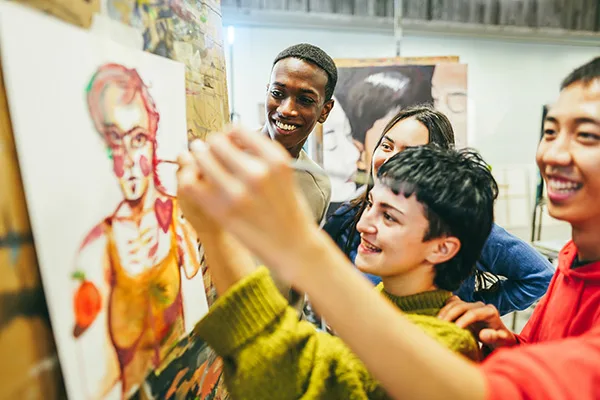
Arts Umbrella: Arts Umbrella did become one of the major not-for-profit arts organizations in the country, but certainly in the province of BC, with an operating budget now exceeding 13 million.
I use the word investments because we have an extraordinary commitment from foundations, corporations, individuals and we also have government support. There is no other example of an organization quite like us. We’re very unusual. We have often slipped through the cracks for traditional government funding. Typically, government funding is well under 10% all of our revenues on an annual basis. Typically, it’s about 5% or 6%, and the rest is earned and contributed income.
That community, the conversation definitely has changed. The statistics that we can share now around community impact, the work we’re doing to break down the barriers for young people, particularly young people in communities that demonstrate vulnerabilities and marginalized communities, mean something to donors nowadays and to foundations. We’re doing the work in all of these areas to help build a healthier community through the arts. The numbers are so significant and they go way beyond this province.
For example, we are now serving about 400 young people in remote Canadian communities through a live online arts education class where we’re going right into the schools. We call it Northern Arts Connection. We’ll partner with many schools across the country. We are sending young people from Arts Umbrella to universities and post-secondary institutions across the country to study the creative arts.
These young people might need a leg up to be able to access this experience. Our donors are supporting that and of course, through our internationally renowned contemporary dance program at the post-secondary level. We’re bringing young, talented artists from across the country and indeed around the world to Vancouver to study with us. The conversation has changed not only in relation to the impact that we are able to have, but that national role and, in some cases, international role that we’re playing as a leader in the area of the importance of arts education in the lives of young people.
Paul, I want to ask you a little bit about the role that you play as CEO in supporting those fundraising efforts. I want to ask this because many of our readers are in the social profit sector, a lot of fundraisers. Having grown up as a fundraiser, both in Albert, but mostly here in Vancouver, I know that when you see a resume that has someone who’s worked at Arts Umbrella, they’re going to be good at volunteer support. They’re going to be good at working with volunteers and they’ve learned how to be a professional fundraiser. As CEO, you interact with donors in a lot of different ways. How do you work with that fundraising team to keep those relationships strong with donors?
I work very closely with that fundraiser. In many ways, my work as a CEO, it might be qualified as I am a fundraising CEO. It’s a big part of what I do. Of course, it’s not the only part, but it’s a critical part of why Arts Umbrella is able to have the impact that we do is. From day one, we have been very fortunate to have the leadership of an extraordinary board of directors.
That community investment starts with your board and then branches out. We do not take for granted the level of support that we have received . It is absolutely critical to our ability to be able to fulfill the aspirations of our mission. I spend an extraordinary part of each day engaging externally. The best part of doing that is to share Arts Umbrella with the community.
In the former Emily Carr University of Art and Design South building, we moved into our new home on Granville Island in early 2021. It’s an extraordinary space and a much bigger space for us that’s been a game changer. I’m not exaggerating, but I’ve probably given 250 to 300 extensive tours of this building. That’s just this building because it is the best way for someone in our community to see what Arts Umbrella is trying to do. Beyond that, to be able to take one of our donors or people who are involved in some of our community programs, to be able to drop into a school or into one of the daycares in which we are delivering our Head Start programs. First off, it’s an extraordinary experience that is very special. I don’t even take it for granted because there’s a lot to set up a meeting like that.
To be able to witness the impact in some of these communities is very special. You can see the difference. I had the chance to visit with one of my colleagues and I’ll be going back a couple of times with some of our donors to one of our Head Start locations. At the end of a 45-minute art session in the visual arts at a daycare center, there was this very young girl. I was getting up to leave and she looked up at me and said, “Do you know what I want to be when I grow up?” I said, “What?” She said, “I want to be an artist.” In that moment, I was like, “My work is done here today. I could take the day off.”
I felt so fulfilled knowing that I’m a part of an organization where these moments happen. Yes, this was something that was led by, in the case of this class, Reba, who has been teaching here for twenty-plus years. Reba called and she inspired these children, but never take for granted the hope and excitement that someone in a daycare situation feels. It’s that moment that creates a safety net for a lot of children that by the time they’re in kindergarten, they have a few more tools in their toolbox to be able to succeed.
Never take for granted the hope and excitement that someone in a daycare situation feels. It's that moment that creates a safety net for children to have a few more tools in their toolbox to succeed. Share on XIt goes from there. It’s being part of a community of support systems that are trying to safeguard our next generation to make them more courageous, empathetic, and compassionate. All of these things are extraordinarily important. Think of what young people are facing growing up in this world. We need them to have as many tools as possible to face this world and hopefully continue to try and make a difference.
I love that answer, Paul. As you’re giving it, I’m imagining your fundraising team huddling together and their only goal, their only metric for success, is how many donors we can get Paul in one of our classes. How do we get Paul to take the donors to show and repeat that experience? If you’ve done 250 or 300 tours, if your fundraisers are any good and I know they’re quite good, they’ve already got the next 300 planned out for you. I hope you don’t get tired of it.
It would be my pleasure, honestly. I’m never tired of it. The best part of the job is to take people to witness what actually takes place.
We’ve had lots of conversations with leaders here on the show. One of the things that we’ve heard a lot is about how the culture of their organization changed throughout the course of the pandemic or as a result of the pandemic. Arts Umbrella had two. Not only the pandemic, but the move that happened in 2021 of the pandemic, the very intense, one-on-one personalized teaching that you do a lot of and you’ve got some distance programs as well. How did that change over the course of the pandemic and what were the implications for the culture there at Arts Umbrella?
The pandemic has had an impact on all of us, myself included. I think we’re all still trying to grapple with the impact, particularly on mental health. Certainly, in an organization that is here to serve young people, children and youth, were more aware of that than ever before. It was challenging for all of us. Going back to 2020 and initially with that lockdown, the organization literally overnight went online and tried to continue to serve as many children as possible.
Very quickly, we tried to find ways to bring young people together to experience art. We were in BC, in particular. We were extremely fortunate that we had more flexibility in what we were doing than in perhaps other sectors. It’s still called for an extraordinary amount of innovation. For example, one of the areas that was hardest hit in the arts community was those of us who sing together. We have a prominent musical theater program for children and youth. What we ended up doing out of sheer necessity, but it was quite amazing, we rented an entire floor of an outdoor parking garage right here on Granville Island, laid down carpet, put up drape. We leased it for six months. At that time, Granville Island was a lot quieter because of the pandemic.
One of the areas that's hard to hit in the arts community is those of us who sing together. We have a prominent musical theater program for children and youth. Share on XWe had heaters and fans and the kids huddled with their ski coats in the winter. We were able to offer our musical theater classes in a space that was safe and to still get them together. These kinds of lengths that were taken to not turn our backs on young people who probably felt more isolated than they had ever experienced. There’s a lot of isolation for young people in this day and age when you think of all of the challenges around social media.
There were many things. I know that some of the hardest hit areas were those programs in the communities that perhaps most benefit in communities where we would normally be operating out of a community center but that center needed to close. Our team was putting together backpacks filled with art supplies and projects that were being provided for young people to do in their homes. To be able to have these delivered to young people who were perhaps spending time at home alone, all of these things, especially in the early days, were very challenging. Of course, we’re still grappling with the impact, but I will say that Arts Umbrella is fully back and even more so now. It’s been so important to see young people together again in studios.
Thanks for sharing that journey. I think a lot of people that are like, “Let’s put that behind us, pretend it didn’t happen and let’s go.” I like how you pulled the innovation from that and connected it to the work happening there now. We’re coming to the end of our conversation, but anyone who’s been reading our conversation, Paul, here’s what a purpose first leader you are.
One of the classes you should probably add is for new executive directors or CEOs to be able to embody and speak eloquently about the reason for their organization and how the community engages with it. That’s impressive. What advice would you have for a first-time CEO or an executive director coming into a role at a place they care a lot about? They are also learning as they start this role?
I think you actually said it, and I do think mentorship is extremely important. One of the big surprises when many of us first step into a CEO role in an organization like Arts Umbrella or any other, is this loneliness factor. It suddenly is something you never considered. To have mentors who can share their own journeys and experiences with you and so many kinds of advice, for example, is not a very complicated thing. They’re how to deal with people.
When many of us first step into the CEO role, there is this loneliness factor. Mentorship is extremely important. Share on XTalking about an experience that is probably very ordinary, but hearing that another CEO who has been through that process handled it and perhaps learned from their error can provide so much support. When I have the opportunity, I actually enjoy the chance to provide some advice to those coming up through the ranks. I certainly had that and it made a huge difference for me. They come from many different parts of your community, from your donors, from your board. My board chairs have all been so extraordinary. That ear, someone who is actually listening to you and providing whatever advice they can, will make all the difference.
As you said that, I was thinking of the advice. When I was in my first CEO role, the chance to sit down with CEOs who’d been in their role for 5, 10, 20-plus years. My biggest takeaway was that even people who’ve done this for a long time don’t have it all figured out. I don’t have to have the right answer tomorrow. I just need to keep at it. I think that that connection to other leaders is important. It’s actually one of the reasons why we love doing the show because it is lonely for CEOs sometimes.
When they read about other CEOs, read an episode, they can think, “I have that problem too,” or, “I struggle with that,” or, “That’s a great way of putting a light on this part of this issue that I hadn’t thought of before.” To share that experience and to have some mentorship. I think the show does a little bit of that. There’s nothing that can replace that one-on-one connection with a colleague. Final question, Paul. This is my favorite question I ask everybody who comes on the show. This is actually how we keep a silent judge. We judge the episode based on the answer to this question, no pressure. Paul, what are you looking forward to?
Arts Umbrella has gone through an extraordinary period of transformation with the opening of our new building and growth in programs at every level. With that comes extraordinary growth and operational requirements and the costs required to ensure that all programs get the support they need. I am looking forward to seeing Arts Umbrella sustainable, having a sustainable business model for decades to come.

Arts Umbrella: The Arts Umbrella has had an extraordinary period of transformation with the opening of its new building and growth in programs at every level.
When that moment comes, I’m not sure when, when I step away from the organization, I look forward to knowing that I am leading it in a great state so that all of the goodness and the impact that comes from and all of the people who have been a part of it can continue. That would be the thing that I would be most looking forward to.
That would be both a fitting and a very exciting legacy to leave for the organization. Before I let you go, how can people learn more about Arts Umbrella and the work you’ve done there?
We have a website. It’s www.ArtsUmbrella.com. On that website, there is a lot of information about the programs for children and youth, and performances. We do a lot of exhibitions and public performances. Our exhibitions, we have a festival coming up called Expressions. All of it’s there. Certainly, on Granville Island, our main facility is here. It’s a very welcoming space and we would love to welcome people.
Thank you so much for being a part of the show.
Thank you for being so kind and for putting a spotlight on Arts Umbrella.

